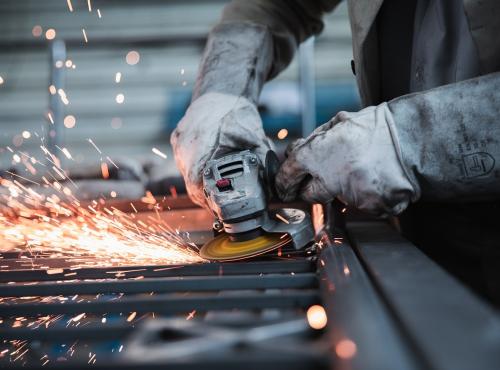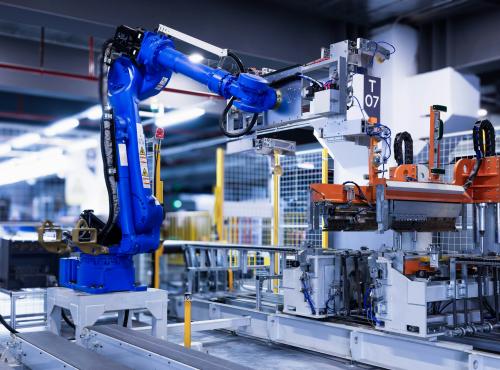Manufacturing Commission Roundtable: Skills for Sustainable Manufacturing
The aim of this roundtable, held on 27th January 2021, was to gather evidence on the current skills landscape within the manufacturing sector and explore how skills provision can be improved to meet the Government’s net-zero target. This will be used to inform the Manufacturing Commission’s forthcoming report, which will determine how sector can be more productive, resilient, and sustainable as it builds back better from the 2020 Coronavirus pandemic.
The session was kindly chaired by Lord Bilimoria of Chelsea, with contributions from commission vice-chair, Professor John Latham, along with members of the Manufacturing Commission and All Party Parliamentary Manufacturing Group.
Speaker: Tor Farquhar, Tata Steel Europe (pictured)
Tor Farquhar is Executive Director of Human Resources at Tata Steel Europe. Tor spent the early part of his career at BP, working in various HR roles across Europe and Asia in the Exploration and Marketing businesses. More recently Tor was Group HR Director at Npower and subsequently as Group HR Director for Alfred McAlpine. Tor has recently been appointed as a member of the Government’s Green Jobs Taskforce.
- The UK’s 6th carbon budget requires a 78% reduction in greenhouse gas emissions by 2035. This is a challenging, but achievable target. It is not a responsible or sustainable solution to ‘offshore’ emissions to achieve this target, and discussions around net zero must focus on what the UK manufacturing sector can do ‘in – house’.
- Our green economy is now well defined. For example, within the energy sector, oil and gas will be replaced by offshore wind, nuclear, and solar. This gives us insight into the skills that will be required to underpin this economy of the future and will require a need to redress and rebalance our approach to net zero.
- In many cases, new technologies will be geographically complimentary to old ones, such as Carbon Capture and Storage (CCS) on former oil and gas sites. However, in other sectors, wide skills gaps exist that need to be bridged, such as in retrofitting homes and businesses to be carbon neutral and energy efficient.
- The green economy of the future will still be steel intensive. However, steel is easily recyclable and consumers understand this. For example, almost all steel/tin cans are recycled and very few end up in landfill. We must ensure that we can make steel in a responsible way, that doesn’t contribute to greenhouse gas emissions.
- The UK must lead the green industrial revolution. We start from an economy with a light (11%) manufacturing base. In a balanced future economy (not an export one such as Germany’s), trade in steel intensive goods could create 500,000 extra jobs and add £20 billion in GDP.
- Environmental responsibility should be built into the syllabus throughout young people’s education. For example, chemistry A-levels could include units on Carbon Capture and Storage, or other technologies that will be key to delivering on the UK’s net-zero target.
- It will be important to improve collaboration between skills providers and reduce competition between them. Regional industrial clusters can allow employers to discuss skills shortages and work with providers to deliver appropriate training.
Discussion
- Recent work by the Confederation of British Industry indicates that that 9 in 10 employees will need to reskill parts of their workforce by 2030 at an additional cost of £13 billion per year. Two thirds of manufacturers do not think that vocational training is keeping pace with the skills that are required.
- The skills system must work with industry to better support lifelong learning and allow people to retrain or move into different disciplines. The current combination of apprenticeships, T levels, and university training offers a good range of skills provision. However, there must be better flexibility to ensure that courses can be responsive to local requirements.
- The proposals in the current White Paper for flexibility in allocation of funds from the Apprenticeship Levy are welcome, as are proposals for expansion of Institutes of Technology. However, there was no offer of support for University Technical Colleges. Encouraging devolution of decision making on skills is important, in order to develop local skills plans.
- 80% of manufacturing businesses find it hard to obtain staff with traditional skills such as STEM. Providers must better liaise with employers and Centres of Innovation to make sure that they understand the skills landscape. If local skills are not available to employers then they may reduce investment in new technology, which can improve productivity and reduce greenhouse gas emissions.
- However, development of technology alone is not the answer. We must understand how supply and value chains can be developed to support the green economy. It will be crucial to develop a map of which skills are needed at what point, by what people, in what quality, and in what location.
- Recent polling from the Midlands indicates that 30% of businesses are unable to recruit to meet their needs and 66% of transport companies are unable to find technicians. The biggest skills gaps exist in
engineering, CAD, light-weighting, green technologies and digital infrastructure. Skills development must cut across Government departments including DEFRA, DfE, BEIS, and MHCLG. - The skills agenda should also focus on people, to develop engaging training and provide meaningful, rewarding jobs. Apprenticeships must be able to flex and adapt to the pace of change and the apprenticeship levy should be portable and adaptable. Some courses may not require complete overhaul, instead they could be tailored to meet the demands of a low-carbon economy. For example, the new skills required to retrofit boilers to use low-carbon gas.
- There remains an issue where Original Equipment Manufacturers (OEMs) sign up for sustainability commitments that then have to be delivered by their supply and value chains. If SME’s in these value chains cannot meet these requirements then OEMs may look elsewhere or overseas. After sales is particularly problematic, as OEM’s do not have control over skills and standards in areas such as servicing.
- We must get better at demand planning for skills. Separation of long term, core skills that we know will be required from those associated with new and fluid new technologies could be an option for skills provision in future.
- At the heart of the change, we require policy that is consistent and enduring. The manufacturing sector has the capability to provide meaningful upskilling opportunities that benefits the UK economy as well as itself. We possess a great deal of expertise across our industry, and there is no reason that wealth of knowledge cannot be harnessed to educate the young, old, and long-term unemployed.



